On December 26, 2022, Russian police stormed the apartment of nineteen-year-old University student Olesya Krivtsova, threatened her with a sledgehammer, then arrested her for terrorism. She’d been denounced to the FSB by fellow students and a vigilante troll. Her crime? An Instagram post questioning the war in Ukraine. But this isn’t a story about a teenager’s naive mistake; it’s a story about the courage to speak truth to power even in the face of its wrath, gently, and without rancor.
This post is essentially the journal I kept while following the story, which was reported in various news outlets and blogs over the months. I’ve listed the main sources at the end, especially for the pictures.
As I followed this story, I was struck by the recurring pattern of history: snitching and denunciation in a totalitarian police state; the pathos of a new generation, including University history students, blind to the lessons of the past, meekly buying into the demagoguery of the latest Führer. Like the Hitler youth, like the Stasi informers, like Lenin’s Komsomol before them. And by something few news outlets remarked on: Olesya’s courage to let her clothes give voice to her opinion, even in the bear’s own cave, even when the Russian state forbid her to speak.
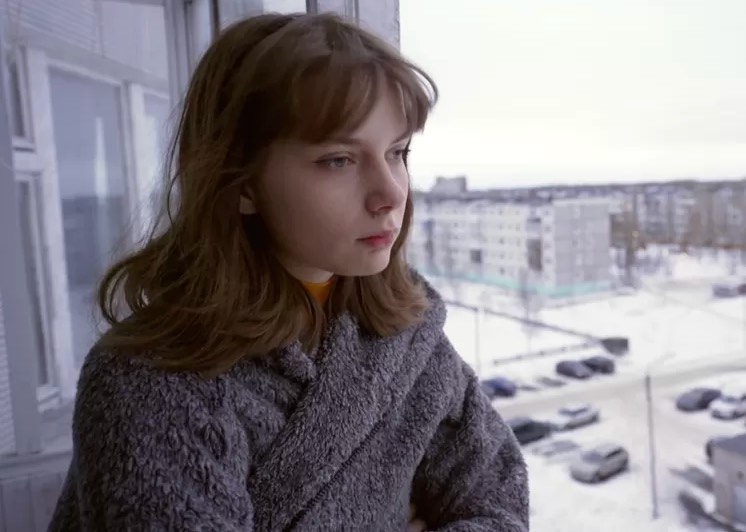
Olesya under house arrest in Arkhangelsk. Photo credit: BBC News, 2023-02-14. Original here.
Protesting the war
The cold, northern Russian city of Arkhangelsk, shortly after the start of the war. Enter Olesya, a public relations student, advertising assistant, pacifist, and vegan lifestyle blogger. Horrified by the invasion, which affected family and friends who lived on the border with Ukraine, she distributed protest pamphlets in the town square. The pamphlets pointed out that Ukraine was home to WWII vets who had defended Russia from the Nazis.
“She did a terrible stupidity,” said her mother, who doesn’t mince words.1 “But that’s Olesya in a nutshell. She has a heightened sense of justice.”
Olesya was spotted by surveillance cameras and dragged from her home in her pajamas to be interrogated. She was only released after having apologized on camera and paying a 30,000 ruble fine.
Though the ordeal terrified her, it didn’t stop her. She posted about the Arctic Federal University forcing its students to participate in pro-war marches. She posted questions and anti-war comments on social media. The one that got her in trouble next was a posting on Instagram that asked rhetorically why Ukrainians were cheering the attack on the Crimea Bridge if they were so desperate to be ’liberated’ by Russia.
Denounced by fellow students
Students in the history department (the one she had wanted to enroll in until her mother talked her out of it), saw her postings and debated in a private Telegram channel whether to denounce her to the FSB. ‘Roman Ironhead’ said he had friends in the security services. ‘Milosh R’ said “Denunciation is the duty of a patriot” 2. A third recommended against denunciation, wisely pointing out that if the administration in Russia changed, denunciations could come back to haunt them.3
Later, while Olesya was waiting for trial, the Russian police refused to give the denunciations to her lawyers, but named two students she knew as prosecution witnesses.
Arrested again
Police burst into her apartment and shoved her to the floor. One of the officers threatened her with a sledgehammer, a weapon of intimidation made popular by a snuff video produced by the Wagner mercenary group in which a convict was executed by sledgehammer for siding with Ukraine.4 They took her to be interrogated while her apartment was searched (and trashed).
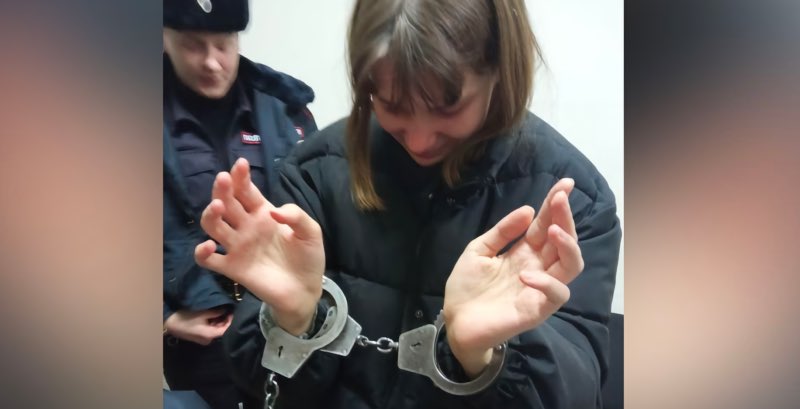
Olesya in handcuffs. Photo credit: Natalya Krivtsova, Olesya’s mother.
The police allege that she threatened to beat a disabled man who attended a University rally in support of the Russian invasion, and took money from Georgia for subversive “actions”. It was clear to observers that the charges didn’t matter so much as the example they wanted to make of her. A trial would have been for show; before one was even scheduled, she was added to the regime’s list of known terrorists.5
29.ru reports that she spent two nights in a cell with women who had been convicted of murder. Olesya said, “I fell asleep only after they fell asleep, because I really was very scared.”3
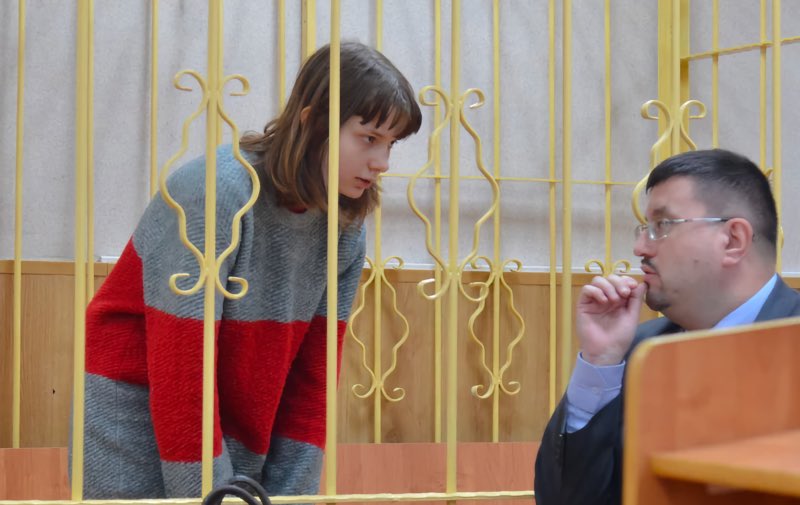
Olesya in the prisoners’ cage in court, speaking to her lawyer. Photo credit: 29.ru
The prosecution asked for her to be kept in prison before trial, but the court remanded her to house arrest.
Hunted by a troll; set up by the cops
Enter Timur Bulatov, embezzler, drunk driver, misogynist, homophobe, and self-styled social cleansing vigilante – a.k.a. ‘Russia’s top snitch’.3 Bulatov became interested in Olesya, and began to troll her in social media. Some suspect that he collaborated with the police to purchase tickets in her name as fake evidence of a plan by Olesya to escape by train. The police used the story to ask the court to make her confinement conditions stricter.1 The judge ordered her to speak to no-one, though the police could not produce evidence she bought the tickets. Bulatov claims to have discovered her plot and outed her as an LGBT activist.
But Olesya thinks he was just used to deflect attention from her classmates. She supports the LGBT community, but denies being an LGBT activist.3
In any event, her classmates were named as witnesses, not Bulatov.
The talking teeshirt
At one hearing, Olesya wore a teeshirt depicting a police van with the words ‘School Bus’ on it,6 and a string of beads that spell out ‘Under the major’s boot’, a reference to a song by Soviet punk rock band Grazhdanskaya Oborona. The teeshirt is both a comment on sad times in Russia (“The send prisoners to war and young people to prison”, as Olesya’s mother put it), and a testament to Olesya’s quiet courage.
If I could buy one of those teeshirts, I would.
She has a tattoo of a spider on her leg that looks uncannily like Vladimir Putin.5
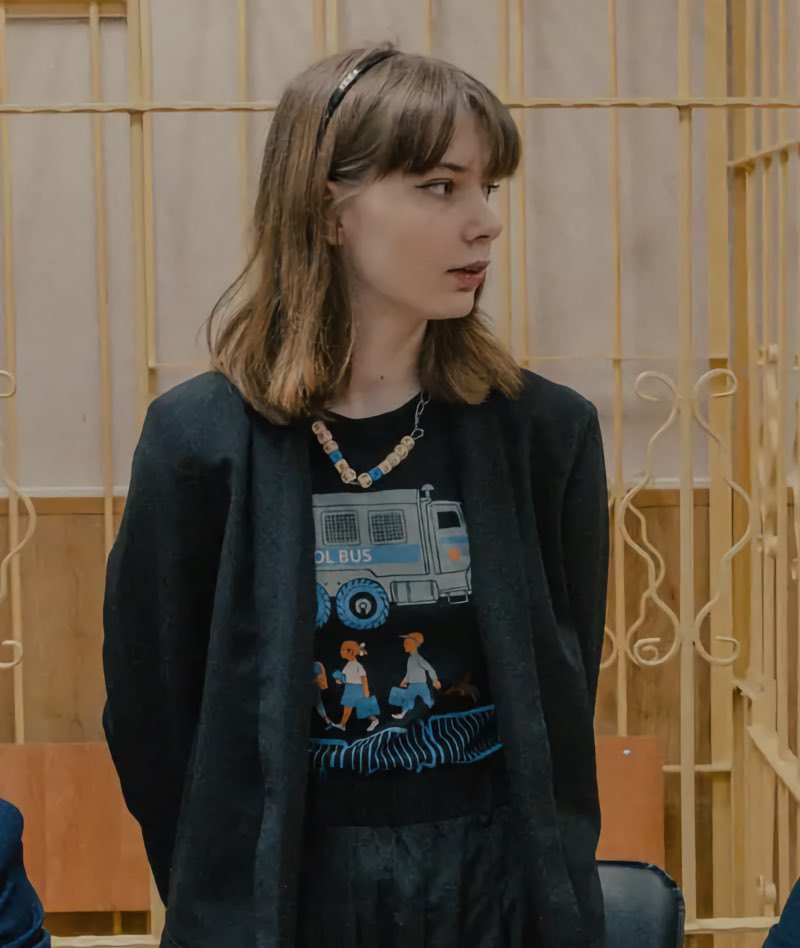
Olesya in front of a court prisoners’ cage. Photo credit: New York Times, 2023-03-22 Original here.
“She’s an idiot”, ranted a party chief on television. “She’s sick,” said Artyom Makulin, head of the University humanities program that Olesya attended. He gave a bad character reference of her to the court, though he had never met her.7 Of the students who denounced her, he said, “Every society has an immune system.”
“Stubborn,” said Olesya’s mother, obviously proud.
Olesya has only thoughtful words for the students who denounced her. As reported by 29.ru3 and translated: “I don’t know what specifically makes them [write denunciations]. When I read the correspondence, I saw that they are really ideological people who do it all for the idea, for the view.”
Escape
Facing 10 years in a Russian prison or penal colony, Olesya escaped to Lithuania dressed as a homeless person, with three changes of car along the way. She recently posted a short video clip in which she cuts the police tracking bracelet from her ankle.
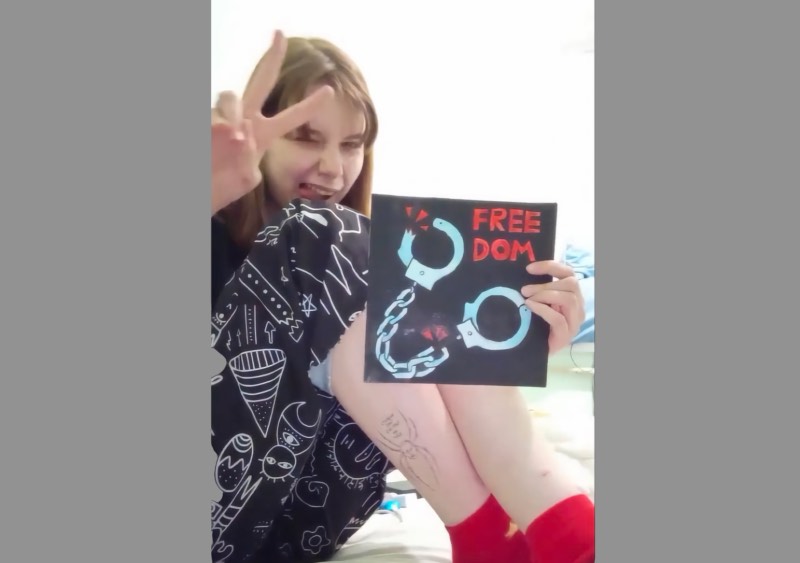
Frame from video on Telegram. Credit: Olesya Krivtsova.
Her escape and the escapes of a few other conscientious objectors are reported in an entertaining article in Stuff.8
Fiction becomes fact … again
Olesya’s story brought to mind several novels about the Nazi and Soviet eras that explore the degenerate, authoritarian cultures in which ordinary people spy and snitch on each other. Here’s a good one for Middle Grade readers: Jennifer Nielsen’s A Night Divided features a fictional heroine evading snitches and Stasi thugs to escape the prison of East Berlin after the wall went up.
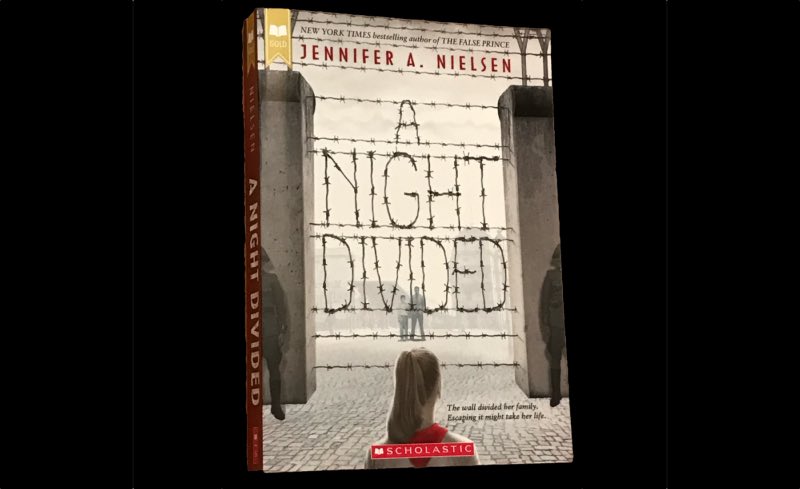
Jennifer Nielsen’s A Night Divided; photo by Gil Harriss.
In closing
I applaud the quiet courage of Olesya Krivtsova, and of her mother, and of reporters still willing to pursue and report on stories like this in Russia, where they are at risk of arrest, interrogation, and jail. I applaud and wish good fortune to the six thousand or so other Russian citizens who have been arrested for peaceful expression of their views since the war began. And I toast Barking Store for a cool teeshirt design.
-
Barents Observer: Snitches and a sledgehammer – the case of Olesya Krivtsova ↩︎ ↩︎
-
Radio Free Europe / Radio Liberty: Anti-War Russian Teen Faces A Long Prison Term ↩︎
-
29.RU: Preparing for the Worst": How does this NArFU student live, study, and what are her plans?" ↩︎ ↩︎ ↩︎ ↩︎ ↩︎
-
CNN: Russian teen faces years in jail over social media post criticizing war in Ukraine (includes a photo of Olesya’s spider tattoo) ↩︎
-
BBC News: Ukraine war: The Russian student under arrest for an Instagram story ↩︎ ↩︎
-
Russians can buy that wonderful teeshirt at Barking Store; if I could, I would. ↩︎
-
New York Times: She Posted Online About the War in Ukraine. Then She Faced a Prison Term. ↩︎
-
Stuff.com.nz: How to flee house arrest in Russia: Escapees tell their secrets ↩︎
